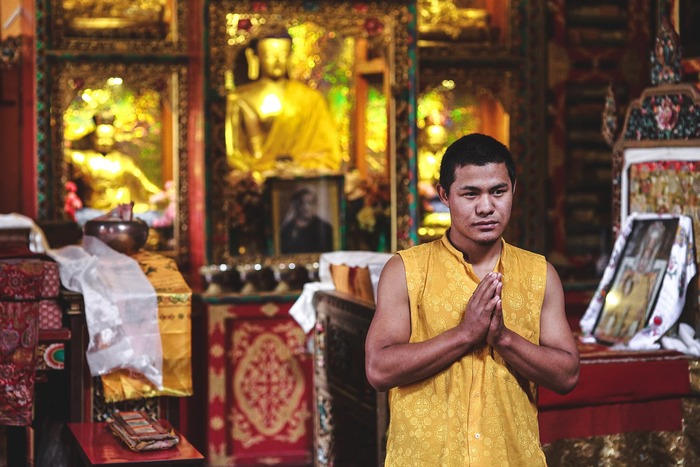
All of us search for meaning in our lives. Some people look for it in their careers, some people by keeping up with the latest fashions, and others by travelling to far-flung destinations. But ultimately, careers end in retirement, fashions change constantly, and holidays are over in the blink of an eye. None of these provide us with permanent satisfaction or happiness. With the millions of choices – materialistic and spiritual – available in our modern world, there is so much confusion about what to do with our lives.
In Buddhism, refuge is about putting a meaningful direction into our lives. That direction is to work on ourselves to overcome all our shortcomings and realize all our potentials to be of best help to ourselves and to everyone. Buddhist refuge acts as a shelter from more than just temporary boredom, hunger or stress. It’s not about changing anything externally: we don’t need to wear any special clothes or change our hairstyles. Refuge in Buddhism is about changing our state of mind. This means deepening our understanding of what gives life purpose, and what will bring us happiness now and in the future. In short, Buddhist refuge protects us from suffering.
Buddhists generally use the phrase “go for refuge” or “take refuge” because refuge is an active process. It is a fundamental step where we commit ourselves to the Buddhist path. But why would we do this? When we understand human nature – that all of us are looking for happiness and satisfaction, and none of us want suffering – we should look for something that will help us. And so in Buddhism, we turn for refuge to the Three Jewels.
These Three Jewels are the Buddha, the Dharma, and the Sangha.
We go for refuge to the Buddha because as an enlightened teacher, he not only shows us the way out of a meaningless existence, but out of suffering completely. He taught that the mind is basically pure and that, with compassion and wisdom, whatever confusion and negative emotions we have can be removed forever so that they never come back. The Dharma is the Buddha’s teachings of how to achieve this, so when we go for refuge, we turn to and adopt the various Buddhist methods for dealing with all the problems in our life. The Sangha are the monks, nuns, and our Buddhist companions. Those among them who truly practice the Buddha's teachings act as role models and inspire us to keep on following the Buddhist path.
Our commitment doesn’t mean we need to isolate ourselves from our friends or society. In fact, when we take refuge in the Three Jewels, we not only create a meaningful life for ourselves, but we open ourselves up to others and start to see how we can contribute to those around us and the world as a whole.
When we take refuge in the Buddha, Dharma, and Sangha, we no longer need to feel confused. We no longer need to shop around spiritually, and although of course we still need some level of material comfort and possessions, we won’t rely on that, imagining it’ll make us happy forever. The commitment we make to Buddhist principles actually frees us from stress and gives us more time to work on what’s important: making ourselves emotionally happier and healthier.
This is why refuge is an ongoing, active process. It’s something that we have to continuously work on. It’s not that we just believe in and pray to the Buddha as if he were some sort of god. And it’s not that our Buddhist friends will be able to do the work for us. This is why it is said that the highest refuge is the Buddha’s teachings, the Dharma. Even if we have strong faith in the Buddha and plenty of wise and compassionate Buddhist friends, we won’t reap the benefits of refuge unless we follow and use the Dharma teachings ourselves. When we follow the main advice, which is to not harm others, to participate in beneficial activities, and to tame our minds, our life will definitely become more meaningful.
Although there are special ceremonies where we can formally start our journey on the Buddhist path, the real commitment has to come from the heart. When we really start to work on ourselves, this is when we have truly taken refuge.